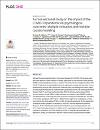A cross-sectional study on the impact of the COVID-19 pandemic on psychological outcomes: Multiple indicators and multiple causes modeling

View/
Date
2022Author
Aljaberi, Musheer A.Alareqe, Naser A.
Alsalahi, Abdulsamad
Qasem, Mousa A.
Noman, Sarah
Uzir, Md. Uzir Hossain
Mohammed, Lubna Ali
Fares, Zine El Abiddine
Lin, Chung-Ying
Abdallah, Atiyeh M.
Hamat, Rukman Awang
Rani, Mohd Dzulkhairi Mohd
...show more authors ...show less authors
Metadata
Show full item recordAbstract
Although the psychological impact of coronavirus disease 2019 (COVID-19) has been evaluated in the literature, further research is needed, particularly on post-traumatic stress disorder (PTSD) and psychological outcomes, is needed. This study aims to investigate the effect of the COVID-19 pandemic on psychological outcomes (depression, anxiety, and insomnia). A cross-sectional study using an online survey was conducted using the following instruments: Impact of Event Scale-Revised (IES-R), Patient Health Questionnaire-9 (PHQ-9), Generalized Anxiety Disorder (GAD-7), and Insomnia Severity Index (ISI). Confirmatory factor analysis (CFA), structural equation model (SEM), multiple indicators and multiple causes (MIMIC) modeling, and differential item functioning (DIF) were performed to analyze the collected data. According to the results, participants with PTSD (n = 360) showed a higher level of depression, anxiety, and insomnia than those without PTSD (n = 639). Among the participants, 36.5% experienced moderate to severe symptoms of depression, and 32.6% had mild depressive symptoms. Moreover, 23.7% of participants experienced moderate to severe anxiety symptoms, and 33.1% had mild anxiety symptoms. In addition, 51.5% of participants experienced symptoms of insomnia. In conclusion, the PTSD caused by COVID-19 is significantly associated with depression, anxiety, and insomnia at the level of latent constructs and observed variables.
Collections
- Biomedical Sciences [853 items ]
- COVID-19 Research [854 items ]

